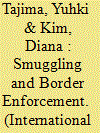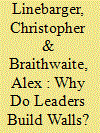| Srl | Item |
| 1 |
ID:
188387


|
|
|
|
|
| Summary/Abstract |
This article analyzes the efficacy of border enforcement against smuggling. We argue that walls, fences, patrols, and other efforts to secure porous borders can reduce smuggling, but only in the absence of collusion between smugglers and state agents at official border crossings. When such corruption occurs, border enforcement merely diverts smuggling flows without reducing their overall volume. We also identify the conditions under which corruption occurs and characterize border enforcement as a sorting mechanism that allows high-skilled smugglers to forge alternative border-crossing routes while deterring low-skilled smugglers or driving them to bribe local border agents. Combining a formal model and an archival case study of opium smuggling in Southeast Asia, we demonstrate that border enforcement has conditional effects on the routes and volumes of smuggling, depending on the nature of interactions between smugglers and border agents. By drawing attention to the technological and organizational aspects of smuggling, this article brings scholarship on criminal governance into the study of international relations, and contributes to debates on the effects of border enforcement and border politics more generally.
|
|
|
|
|
|
|
|
|
|
|
|
|
|
|
|
| 2 |
ID:
186324


|
|
|
|
|
| Summary/Abstract |
States around the world are fortifying their international borders at unprecedented rates. While only seven states had fortified their borders with walls or fences as of the end of World War Two, this number has now grown to more than 75. Why do states build walls on their international borders? While states may build walls to ameliorate the consequences of cross-border economic inequalities and to defend against transnational security threats, we suggest that another compelling logic stems from domestic politics and leaders’ desire to remain in office. Building on assumptions furnished by diversionary theory, we argue that national political leaders at risk of losing office are incentivized to implement popular policies, such as border wall construction, hoping that doing so will prompt a domestic rally effect. To test this argument, we assemble a global dataset of leader-years and find that politically insecure leaders are more likely to be seen to start and continue border wall construction.
|
|
|
|
|
|
|
|
|
|
|
|
|
|
|
|